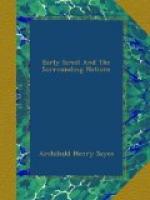Abraham took with him to the west the traditions and philosophy of Babylonia, and found there a people already well acquainted with the literature, the law, and the religion of his fatherland. The fact is an important one; it is one of the most striking results of modern discovery, and it has a direct bearing on our estimate of the credibility of the narratives contained in the Book of Genesis. Written and contemporaneous history in Babylonia went back to an age long anterior to that of Abraham—his age, indeed, marks the beginning of the decline of the Babylonian power and influence; and consequently, there is no longer any reason to treat as unhistorical the narratives connected with his name, or the statements that are made in regard to himself and his posterity. His birth in Ur, his migration to Harran and Palestine, have been lifted out of the region of doubt into that of history, and we may therefore accept without further questioning all that we are told of his relationship to Lot or to the tribes of north-western Arabia.
In Canaan, however, Abraham was but a sojourner. Though he came there as a Babylonian prince, as an ally of its Amoritish chieftains, as a leader of armed troops, even as the conqueror of a Babylonian army, his only possession in it was the burial-place of Machpelah. Here, in the close neighbourhood of the later Hebron, he bought a plot of ground in the sloping cliff, wherein a twofold chamber had been excavated in the rock for the purposes of burial. The sepulchre of Machpelah was the sole possession in the land of his adoption which he could bequeath to his descendants.
Of these, however, Ishmael and the sons of Keturah moved southward into the desert, out of the reach of the cultured Canaanites and the domination of Babylonia. Isaac, too, the son of his Babylonian wife, seemed bent upon following their example. He established himself on the skirts of the southern wilderness, not far on the one hand from the borders of Palestine, nor on the other from the block of mountains within which was the desert sanctuary of Kadesh-barnea. His sons Esau and Jacob shared the desert and the cultivated land between them. Esau planted himself among the barren heights of Mount Seir, subjugating or assimilating its Horite and Amalekite inhabitants, and securing the road which carried the trade of Syria to the Red Sea; while Jacob sought his wives among the settled Aramaeans of Harran, and, like Abraham, pitched his tent in Canaan. At Shechem, in the heart of Canaan, he purchased a field, not, as in the case of Abraham, for the sake of burial, but in order that he might live upon it in tent or house, and secure a spring of water for his own possession.




